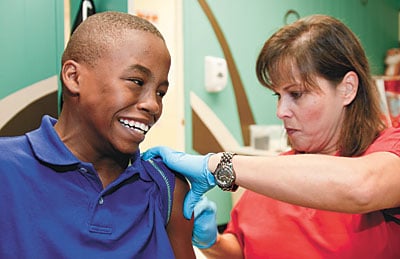School nurses help hundreds
of families
By Nick Tabor, New Era Staff Writer
In the late morning on Thursday, as the cafeteria
down the hall got noisy with chatter and the shuffling of trays, Rita Poe
entered the nurse’s office at Hopkinsville
Middle School and took
her usual seat at a table.
She carried a small case of tools for treating her
seventh-grade daughter’s diabetes.
The nurse, Deana Garrett, greeted her but continued
with her business: checking names off a list of kids who needed to pick up
medications, putting a Band-Aid on the toe of a girl whose leg cast chafed her
skin, rubbing calamine lotion onto a boy’s bug bite.
Soon Poe’s daughter, Heather, came in and ate her
lunch quietly. Today’s meal — a sandwich and an apple — didn’t affect Heather’s
blood sugar enough to demand an insulin shot. She said goodbye to her mother
and left as quietly as she’d entered.
They go through this routine in Garrett’s office
every day, Rita Poe said. Since a doctor diagnosed Heather Poe two months ago,
she has only felt comfortable getting shots from her mother. Garrett, herself a
mother of three girls, helped them work out a system.
Garrett, like Christian County’s
15 other full-time school nurses, plays a singular role in hundreds of
families’ lives.
Unlike a doctor, whom most kids only visit for
serious needs and occasional check-ups, Garrett is always a minute’s walk from
every student in the school. She treats them for bug bites and stomach aches;
she screens them for hearing and vision problems and makes sure everyone gets a
physical; she helps indigent families find treatment options; she monitors more
than 20 students every day for chronic illnesses; and she coaches them on
healthy living and disease prevention.
She’s the first line of defense against every kind
of sickness. From one perspective, she’s a model for preventive care.
Familiar faces
Garrett, 44, became a school nurse seven years ago,
after five years at the Christian County Health Department’s clinic. She wanted
to work on her daughters’ school schedule, with the same mid-year breaks and
summer vacation. School nursing also promised less stress than clinic work.
As the students got to know Garrett, her office
became a place of comfort for many.
She recalls a girl with a 103-degree temperature
whose parents Garrett couldn’t reach. She let the girl sleep on the padded
bench in her small office until the school day ended.
“That’s when you’ve got to step up and kind of be
their parent,” she said.
Some students gravitate toward her office without much
cause: either to say hello or to complain of some made-up illness. But she’s
identified all the “frequent fliers,” meaning the hypochondriacs and the
students who use nurse visits as a way to get out of class. She weeds them out
by insisting they get teachers’ referrals.
And by recognizing symptoms when they’re truly sick,
on account of her history of treating them.
“Teenagers will be teenagers,” she said. “They try
to slip one by you every now and then.”
In addition to two students with diabetes, she has
20 who need medication every day. She keeps track of them on a chart, and if
they don’t come, she tracks them down.
“‘Well, I can always find you’ — I tell them that.”
Comprehensive
care
Leadership of the school nursing program transferred
from the Christian
County Board of Education
to the Christian County Health Department in 2009. The health department now
oversees 18 educational facilities, including 15 regular schools, said Beth
Campbell, the school nursing coordinator.
All of its nurses have a Kentucky nursing license and at least a year
of experience.
At the beginning of each school year, they get parents to fill out a registration packet to document their child’s health status and needs, Campbell said. The health department provides physicals in schools for kids who can’t get them from private doctors.
At the beginning of each school year, they get parents to fill out a registration packet to document their child’s health status and needs, Campbell said. The health department provides physicals in schools for kids who can’t get them from private doctors.
It gives immunizations and screenings for dental
work, scoliosis, and hearing and vision problems. It brings dentists from the University of Kentucky to work on pre-school and
kindergarten students. It obtains medicine refills straight from students’
doctors.
“We really do anything they need to have done in the
schools,” Campbell
said. “Or anything they need done at home.”
Many students wouldn’t receive medical care at all
if not for school nurses, said Mark Pyle, the health department’s director.
Sometimes school nurses can help parents find
funding sources for children’s treatment. When they can’t, they personally ask
a doctor to treat a child for free.
“I think that we are really good liaisons between
the kids and their families and their physicians when they use us,” Campbell said.
When a sickness starts spreading among students,
like chicken pox or the flu, the nurse’s responsibility for the entire school
becomes clear. She might recommend immunizations and other measures in the
school bulletin, and when it’s necessary, work with the health department to
close the school temporarily.
Sometimes students come to Garrett’s office and say,
“It happened again!”
“What?” she’ll ask.
“What I was in here for last week!”
They seem dismayed when she doesn’t remember.
“Listen,” she says. “There’s hundreds of you.
There’s one of me.”
But the students’ attitude betrays their dependence
and comfort with Garrett.
They always know where to find her.


No comments:
Post a Comment